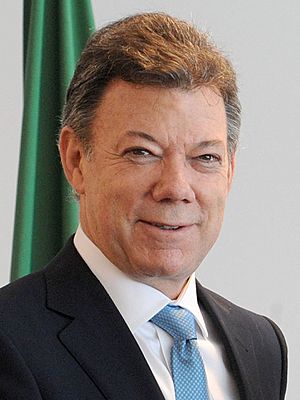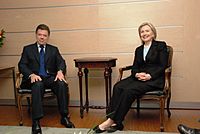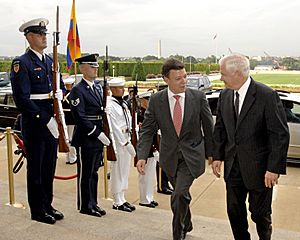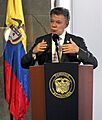Juan Manuel Santos facts for kids
Quick facts for kids
Juan Manuel Santos
|
|
|---|---|

Santos in 2010
|
|
| 33rd President of Colombia | |
| In office 7 August 2010 – 7 August 2018 |
|
| Vice President | Angelino Garzón Germán Vargas Lleras Oscar Naranjo |
| Preceded by | Álvaro Uribe |
| Succeeded by | Iván Duque |
| President pro tempore of the Pacific Alliance | |
| In office 30 June 2017 – 24 July 2018 |
|
| Preceded by | Michelle Bachelet |
| Succeeded by | Martin Vizcarra |
| In office 23 May 2013 – 20 June 2014 |
|
| Preceded by | Sebastián Piñera |
| Succeeded by | Enrique Peña Nieto |
| Minister of National Defence | |
| In office 18 July 2006 – 18 May 2009 |
|
| President | Álvaro Uribe |
| Preceded by | Camilo Ospina Bernal |
| Succeeded by | Freddy Padilla de León (acting) |
| Minister of Finance and Public Credit | |
| In office 7 August 2000 – 7 August 2002 |
|
| President | Andrés Pastrana Arango |
| Preceded by | Juan Camilo Restrepo Salazar |
| Succeeded by | Roberto Junguito Bonnet |
| Minister of Foreign Trade | |
| In office 18 November 1991 – 7 August 1994 |
|
| President | César Gaviria |
| Preceded by | Position established |
| Succeeded by | Daniel Mazuera Gómez |
| Presidential Designate of Colombia | |
| In office 11 August 1993 – 7 August 1994 |
|
| President | César Gaviria |
| Preceded by | Humberto De la Calle |
| Succeeded by | Position abolished |
| Personal details | |
| Born |
Juan Manuel Santos Calderón
10 August 1951 Bogotá, Colombia |
| Political party | Social Party of National Unity (since 2005) |
| Other political affiliations |
Liberal (until 2005) |
| Spouses | Silvia Amaya Londoño (divorced) María Clemencia Rodríguez Múnera
(m. 1987) |
| Children | Martín María Antonia Esteban |
| Alma mater | University of Kansas (BA) London School of Economics (MSc) Harvard University (MPA) |
| Awards | Nobel Peace Prize (2016) |
| Signature |  |
| Military service | |
| Allegiance | |
| Branch/service | Colombian Navy |
| Years of service | 1967–1971 |
Juan Manuel Santos Calderón (born August 10, 1951) is a Colombian politician who served as the President of Colombia from 2010 to 2018. He is most famous for winning the 2016 Nobel Peace Prize for his efforts to end a civil war in his country that had lasted for more than 50 years.
Santos comes from a wealthy and powerful family in Colombia. His family were the main owners of El Tiempo, one of Colombia's most important newspapers, for almost 100 years. Before becoming president, he worked as an economist and a journalist.
He held several important government jobs, including Minister of Foreign Trade and Minister of Finance. He became well-known as the Minister of National Defence under President Álvaro Uribe. During this time, he took a strong stand against rebel groups like the FARC.
In 2010, Santos was elected president. A major goal of his presidency was to make peace with the FARC. After years of talks, his government signed a peace deal. For this work, he was awarded the Nobel Peace Prize. However, the peace deal was controversial in Colombia and divided the country.
Contents
Early Life and Education
Juan Manuel Santos was born in Bogotá, the capital of Colombia. He went to a private high school called Colegio San Carlos. In 1967, he joined the Colombian Navy and graduated from the Admiral Padilla Naval Cadet School in 1969.
After serving in the navy, Santos moved to the United States to study at the University of Kansas. He earned a degree in Economics and Business Administration in 1973. He later continued his studies in London and at Harvard University, earning master's degrees.
For a time, he worked for the National Federation of Coffee Growers of Colombia in London. He also worked as a top editor at his family's newspaper, El Tiempo.
Political Career
Santos began his political career in 1991 when he was named Colombia's first Minister of Foreign Trade. He later served as the Minister of Finance from 2000 to 2002.
In 2005, he helped create the Social Party of National Unity (Party of the U). This political party supported the policies of President Álvaro Uribe. After Uribe was re-elected in 2006, he appointed Santos as the Minister of National Defence.
Minister of National Defence
As Minister of Defence, Santos led many successful operations against the FARC, a powerful rebel group. These operations included rescuing hostages, such as former presidential candidate Ingrid Betancourt.
However, his time as minister was marked by a serious issue known as the "false positives" scandal. This was a situation where some members of the army were accused of killing innocent civilians and falsely reporting them as enemy fighters to receive rewards. Santos acknowledged the problem and removed several high-ranking military officers from their posts.
In 2009, Santos resigned as Defence Minister to run for president.
Presidency (2010–2018)

Juan Manuel Santos won the presidential election in 2010. He was re-elected for a second term in 2014. One of the biggest goals of his presidency was to end the long-running armed conflict with the FARC.
Peace Talks with FARC
In 2012, Santos announced that his government had started peace talks with the FARC. He said he wanted to learn from past mistakes and find a lasting peace. The talks took place for several years, mostly in Havana, Cuba.
His decision to negotiate with the FARC was criticized by some, including his former ally, ex-President Uribe. Uribe believed Santos was giving too much away to the rebel group.
In 2016, the government and the FARC announced they had reached a peace agreement. The deal was put to a vote in a national referendum, but the Colombian people narrowly voted against it.
Despite the vote, Santos did not give up. His team worked with the FARC to create a revised peace deal. This new agreement was approved by the Colombian Congress in November 2016, officially ending the conflict.
2016 Nobel Peace Prize
For his determined efforts to end the war, Santos was awarded the 2016 Nobel Peace Prize. The Nobel Committee praised him for his work, even though the conflict had cost over 220,000 lives and forced millions of people from their homes.
Personal Life
Santos comes from a very influential family in Colombia. His great-granduncle, Eduardo Santos Montejo, was President of Colombia from 1938 to 1942. His cousin, Francisco Santos Calderón, was Vice President from 2002 to 2010.
Santos was married to Silvia Amaya Londoño, but they later divorced. He then married María Clemencia Rodríguez Múnera. Together, they have three children: Martín, María Antonia, and Esteban.
Images for kids
See also
 In Spanish: Juan Manuel Santos para niños
In Spanish: Juan Manuel Santos para niños



